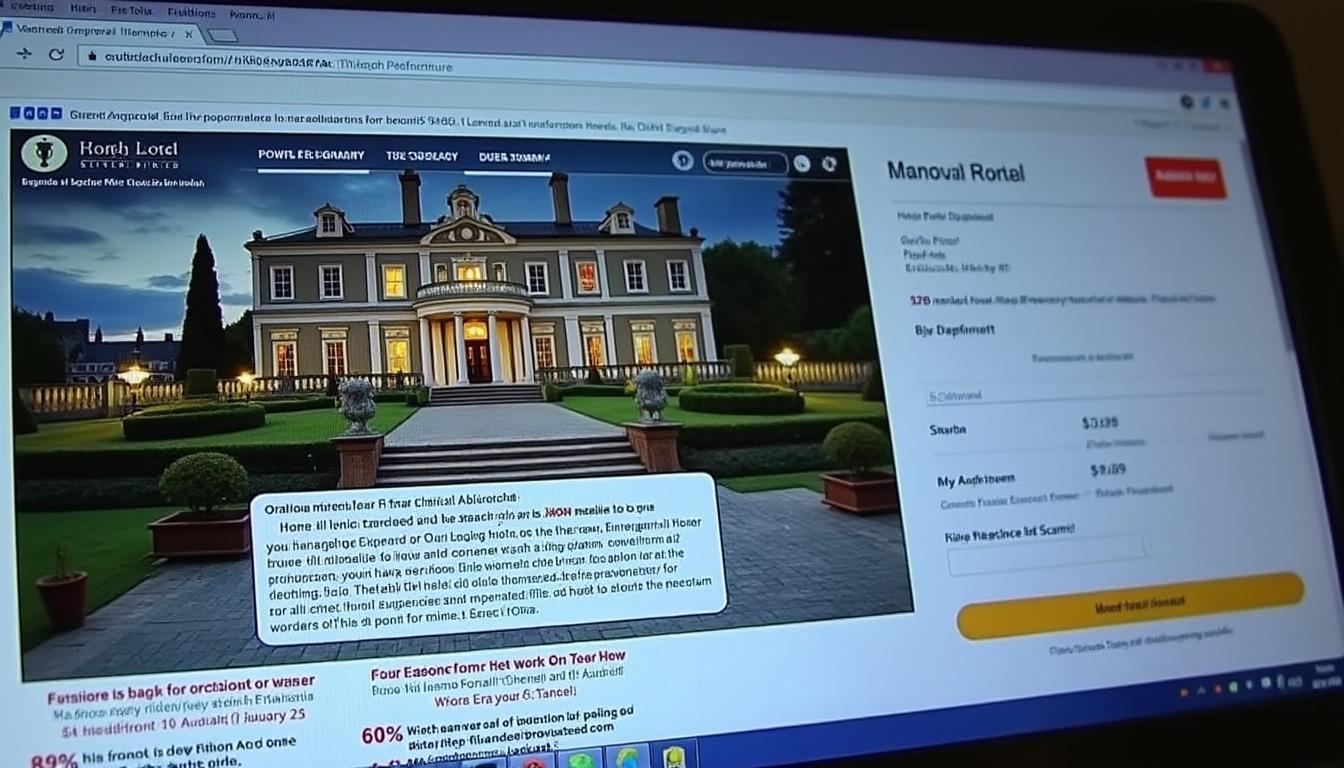In the wake of a growing concern surrounding fraudulent listings on Booking.com, significant scrutiny has emerged regarding how the platform handles its user-generated content. A recent investigation unveiled alarming statistics, revealing that the site has become a haven for scammers, which underscores the urgent need for enhanced security measures. This situation is compounded by an increasing volume of reports alleging that unsuspecting travelers have become victims of scams due to the site’s automated listing and booking processes, which lack comprehensive verification systems.
Understanding the Rise of Fraudulent Listings on Booking.com
Booking.com has gained considerable traction as a leading platform for vacation rentals, rivaling competitors like Airbnb and Expedia. However, this popularity has made it an attractive target for fraudsters. As of recent reports, over 530 instances of fraud were reported between June 2023 and September 2024, amounting to a staggering £370,000 in total losses. The findings from the consumer group Which? indicated that approximately one in ten users reported experiencing fraudulent activities on the platform, which is a profound concern for a service that prides itself on user trust.
Scammers are employing increasingly sophisticated tactics to exploit the system, often creating convincing listings using photos of actual properties that they do not own or control. For example, a recent case involved a lavish 12-bedroom manor in Surrey, absurdly listed at a fraction of its market value. The real owner, having never listed the property on Booking.com, received inquiries from bewildered potential renters after discovering that the pictures from his home were being used without consent. Cases like this underscore the profound implications for consumers who are misled into believing they are securing legitimate rentals.
- Fake listings: Many of these listings present properties that don’t exist or do not belong to the alleged owners.
- Stolen identities: Fraudsters sometimes hijack genuine accounts of legitimate property owners, using their identities without permission.
- Phishing attempts: Some users have faced attempts by fraudsters to obtain personal financial information through fake emails or messages that appear to be from Booking.com.
To illustrate how deep this issue runs, according to a spokesperson for Booking.com, the company emphasizes that they implement a number of verification processes during user sign-up. Nevertheless, users like Glyn Powell-Evans, the owner of the aforementioned Surrey manor, argue that these measures have proven inadequate as his property was listed without his knowledge for an extended period before action was taken.

Challenges in Controlling Fraudulent Listings
The ongoing difficulty of managing fraudulent listings primarily arises from two crucial aspects of the Booking.com platform—its reliance on automated tools and insufficient manual verification processes. Automated systems can quickly list properties but often lack the sophisticated checks necessary to identify fraudulent activity. As more travelers turn to platforms like Booking.com for their holiday plans, it becomes increasingly vital that the company addresses these shortcomings without delay.
According to various reports and user testimonials, the challenges involved in combating fraudulent listings on Booking.com can be categorized as follows:
- Automation vulnerabilities: Although automation assists in processing large volumes of listings, it poses inherent risks as fraudulent entries can easily slip through.
- Lack of user identity verification: Unlike platforms such as Agoda and TripAdvisor, where stricter verification protocols exist, Booking.com’s approach is less stringent.
- Delayed responses: Users have reported long wait times when attempting to resolve issues regarding fraudulent listings, as exemplified by Mr. Powell-Evans’ ordeal that lasted nearly a month.
This creates a concerning landscape where legitimate hosts are affected by scams, raising the question: how can users safeguard themselves while navigating this tricky terrain? It is crucial for travelers to conduct their due diligence. This includes verifying listings across multiple platforms and checking for direct contact information where possible.
Proposed Solutions for Increasing User Safety on Booking.com
With the significant rise in fraudulent activity, consumer advocates, including the aforementioned Which?, have called for immediate reform from Booking.com. One of the primary recommendations is implementing a rigorous system of identity verification for both property owners and renters. This could take the form of:
- Identity checks: Requiring a government-issued ID prior to a listing becoming active, which could help ensure the authenticity of property owners.
- Two-factor authentication: Implementing a 2FA system during sensitive transactions can reduce instances of account takeovers.
- Enhanced reporting systems: Creating an intuitive interface for users to report scams quickly can vastly improve response time to fraudulent activity.
Furthermore, several industry experts have suggested that enhancing community feedback mechanisms could prove beneficial. Encouraging reviews and ratings from previous guests would help to create an additional layer of scrutiny on listings. This peer review method is already successfully adopted by major competitors like Airbnb and Hotels.com and could significantly bolster user confidence in Booking.com.
| Suggested Safeguards | Benefits |
|---|---|
| Identity verification | Increases trust in listings |
| Two-factor authentication | Mitigates risk of account hacking |
| User feedback systems | Provides transparency and credibility |
Broader Implications of Fraudulent Listings on the Travel Industry
The ramifications of fraudulent listings transcend individual users and have repercussions for the entire travel industry, particularly in an era where online bookings dominate the market. A tarnished reputation for platforms like Booking.com could result in a decrease in user trust, thereby impacting revenues not only for the site itself but also for the businesses that rely on it, such as property owners and旅游 agents.
As reported across various travel industry publications, enhanced security measures on Booking.com could potentially establish a new industry standard. However, until these changes are enacted, the anxiety around safety when booking online persists. Consumers have begun to question the integrity of any platform that doesn’t employ rigorous listing processes. Negative experiences shared through social media may deter potential customers from utilizing services altogether, paving the way for competitors to seize market share.
- Reputation damage: Long-term consequences can arise from consistently poor user experiences.
- Trust issues: Consumers may choose alternative sites like VRBO or Priceline, which already implement stricter verification.
- Market shifts: A shift in user preference can lead to significant financial implications for Booking.com.
As such, a solution that not only secures user transactions but also fortifies the platform’s reputation is essential moving forward, especially in light of the more extensive scrutiny that regulatory bodies, like Ofcom, are expected to impose.

User Experiences and Testimonials: Lessons Learned
The narratives of individual users who have encountered scams on Booking.com highlight the urgency of addressing these vulnerabilities. For instance, Eddie Smoraczewski faced a situation where his personal account had been compromised, leading to fraudulent bookings he was unaware of until receiving a confirmation email. His experience underscores the real-world consequences of inadequate security measures. Unlike traditional hotel bookings where such verification is often stricter, online platforms like Booking.com can become more susceptible to these types of incidents without proper checks in place.
User testimonials reflect a growing disenchantment with the platform, particularly when cases like Smoraczewski’s result in financial strains and unnecessary anxiety. Many users have expressed frustration at the slow response from customer service when attempting to contest unauthorized transactions. The following stories illustrate that the impact of these scams is felt not only financially but emotionally as well.
- Mr. Powell-Evans’ experience: After receiving various unsolicited calls from potential renters, he fell into frustration, revealing a lack of responsiveness from Booking.com when trying to resolve the issue.
- Stories from scam victims: Many report feeling helpless and disillusioned, having believed they were securing legitimate accommodation only to face lost deposits and cancellation issues.
- Shared frustrations: Countless individuals have taken to social media to vent their experiences, with many suggesting that fraudulent listings contribute to a larger cultural issue regarding trust in online marketplaces.
This ongoing dialogue among users serves as a reminder of the need for Booking.com and similar platforms to take comprehensive action to evolve with the changing landscape of online transactions. Such action not only protects the bottom line but also restores confidence among consumers eager to explore the vast array of properties available for vacation rental.
